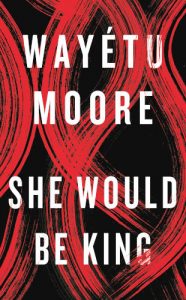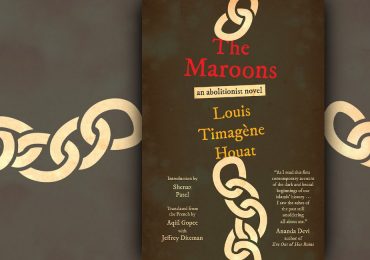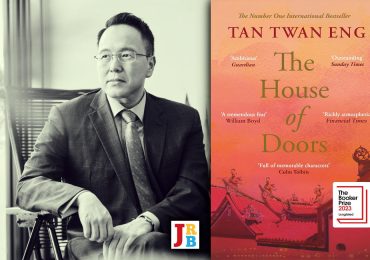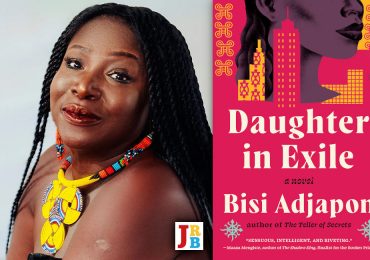Fantastic Returns and Where to Find Them—The JRB Francophone and Contributing Editor Efemia Chela travels to Liberia with Wayétu Moore’s debut novel, She Would Be King, in our Temporary Sojourner series.
Liberia’s past is in pieces’, he said, ‘and here’s one of them. Maybe it’s the one you’re looking for.
—James Dennis, ‘Nina Simone in Liberia’, Guernica magazine
I feel most colored when it is too late.
—Morgan Parker (‘After Glenn Ligon after Zora Neale Hurston’), Magical Negro
When I am captive.
The last thing on my mind is death.

She Would Be King
Wayétu Moore
Pushkin Press, 2019
The ability to return is a rare privilege, whether it’s for another run in TV land (see Twin Peaks: The Return), another book in the dystopian world you’ve created (see The Testaments by Margaret Atwood), or to the place of your ancestors. And while African Americans have, since Alex Haley’s epic came out, wandered around West Africa looking for their Roots, the send-away DNA kits that have proliferated in recent years have fuelled more intimate expeditions into personal history. Ghana, in a shrewd attempt to bring in more tourist revenue, even officially billed 2019 as ‘The Year of Return’, and has been hosting several events.
In fact, I hail from one of the hubs of ancestry tourism—Elmina, some 150 kilometres southeast of Accra—and am involved in the industry in an oblique way, owing to our small family museum, which traces one branch of our genealogical tree to 1700s Holland. As a perpetual émigré, the idea of returns have forever held enchantment for me. So Wayétu Moore’s She Would Be King was a natural selection for a temporary sojourn in Liberia.
Since the first American Colonization Society ship, Elizabeth, left the United States in 1820, Liberia has been the original African escapist fantasy, where the trauma of the past can be cast off and a rebirth can occur. It held the same promise for newly freed slaves as it did for a troubled Nina Simone in 1974. The High Priestess of Soul was invited there by Miriam Makeba, and enjoyed its comparative freedoms so much she stayed on for three years. The country, however, was not to be her salvation—nor is it so easy for the three main characters in She Would Be King.
June Dey, Gbessa and Norman Aragorn have magical powers and are the wellsource of fantastical elements in the book. Moore’s novel is vaguely reminiscent of Black Panther: central to both is a promised land—Monrovia for the former, Wakanda for the latter—magical powers, and alternate retellings of history. June Dey is a slave from Virginia, born on the Emerson plantation. He’s the living embodiment of the folk legends of resistance that slaves in the American South told and retold each other, like the tales of slaves who could get up and fly away from their bondage. June Dey doesn’t fly, but he does have superhuman strength: neither knives nor bullets can pierce his skin. Norman Aragorn, a mulatto (the word used in the book), is born of an unscrupulous father, with a single-minded desire to bring back to England a magnificent anthropological discovery, and Nanni, a Jamaican Maroon (ditto) who is raped and enslaved by him. From his mother, who tries to protect him from his father’s experiments, he inherits the ability to vanish and reappear at will. Gbessa, meanwhile, is a striking red-headed indigenous Liberian, from the Vai people, and she is cursed to be immortal.
As is superheroes’ wont, they are on a quest, and while the parameters of the quest shift, it all hinges upon the ethical and practical feasibility of the founding of Monrovia. Rippling through this sweeping and poetic book is what Namwali Serpell calls ‘accidents of history’— the boarding of the wrong ship, the glimpsing of a stranger, the fall in the forest — which take the characters to frightening and heart-racing places.
Moore is adept at teasing out the contradictions of Monrovia and forces us to confront the nuances of power with every decision her characters make. The ‘new republic’ is fraught with old problems—political infighting, class strife, marriages of convenience and racial superiority. In fact, the critique levelled by some at Black Panther, of inherent counter-revolutionariness, is echoed by certain characters as they watch Monrovia being brought into being at the expense of indigenous Liberians.The inclinations of the Black Americans who have come over disrupt attempts at integration, and show how quickly hierarchies have been constructed in the short time the settlement has existed. Gerald Tubman, a prominent community leader, relates this to the more idealistic Henry Hunter, whom Gbessa does housework for:
Gerald warned Henry that free slaves who occupied Monrovia had rather quickly adapted to the new land as an American abolitionist would to a Southern state with a significant Negro population. If the abolitionist offered a Negro a job tending his farm and that Negro turned it down, the abolitionist would take offense because how dare the Negro neglect the opportunity of his own life’s advancement?
Similarly, June Dey also realises that not all skinfolk are kinfolk when the optics of his enemy changes, causing him to question his previously narrow takes on loyalty and justice. He moves from enacting vengeance on white plantation owners in Virginia to defending villages from the threat of black slavers paid by the French to capture free Africans. Thus Moore gives us the painful birth of a nation, complicating the narrative of returnees, showing that good intentions often fall short—and that unintended consequences of the prodigal sons’ and daughters’ actions can wreak widespread havoc.
Central to the book is also the nature of violence. Charlotte Emerson, an outcast slave on the plantation where June Dey is born, notes sagely:
Punishment, especially the kind given by those who have nothing, can be a big and addictive thing. Cruel as it is that small taste of power is juicy. It lasts long.
Outside of the physical cruelty of slavery, explored especially in June Dey’s storyline, violence is wielded in the form of isolation—especially against women. The aforementioned Charlotte is exiled to a lonely shack on the edge of the Emerson plantation. In addition to being captured by Callum Aragorn (Norman’s father), Nanni’s freedom of movement is curtailed as she is forbidden from being left alone with her son or roaming away from Callum’s quarters. Through these lone wolf women, Moore explores gendered aspects of violence.
Gbessa, meanwhile, appears to be the magical realist rendering of the ‘strong black woman’ archetype. Thought to be a witch, born under a bad sign as her birth coincides with the death of one of the village elders, she is banished from Lai and sent to the forest where she spends years starving and alone. Though her paths cross with June Dey and Norman Aragon, before long she is abducted by slavers and tortured. Later still, once she marries, her shift in social standing detaches her from her hard-won friends and plunges her into the pit of vipers that make up high-society Monrovia. Gbessa, the immortal, is not allowed the cold, still peace of death: her complex suffering is interminable, to the point where one wonders if she might stand as a metaphor for failed and tattered post-slavery, postcolonial nation-building projects.
The only place where She Would Be King stumbles is it ending, which comes too quickly. Historical fiction is hard to do in 371 pages, especially when the story spans two continents. The book is rich with potential subplots that are never fleshed out, and it seems that a much longer story would do better service to the characters Moore has created and the unique universe they find themselves in.
- Temporary Sojourner is a series of articles by Contributing Editor Efemia Chela on fiction from around the African continent. Reading is the cheapest way to travel, after all. This is the ninth article in the series, which draws its name from the eponymous collection of short stories, first published in 1989 and reprinted in 2011, by Editorial Advisory Panel member Tony Eprile.






One thought on “[Temporary Sojourner] Liberia, the original African escapist fantasy—Efemia Chela reviews Wayétu Moore’s sweeping and poetic debut novel She Would Be King”